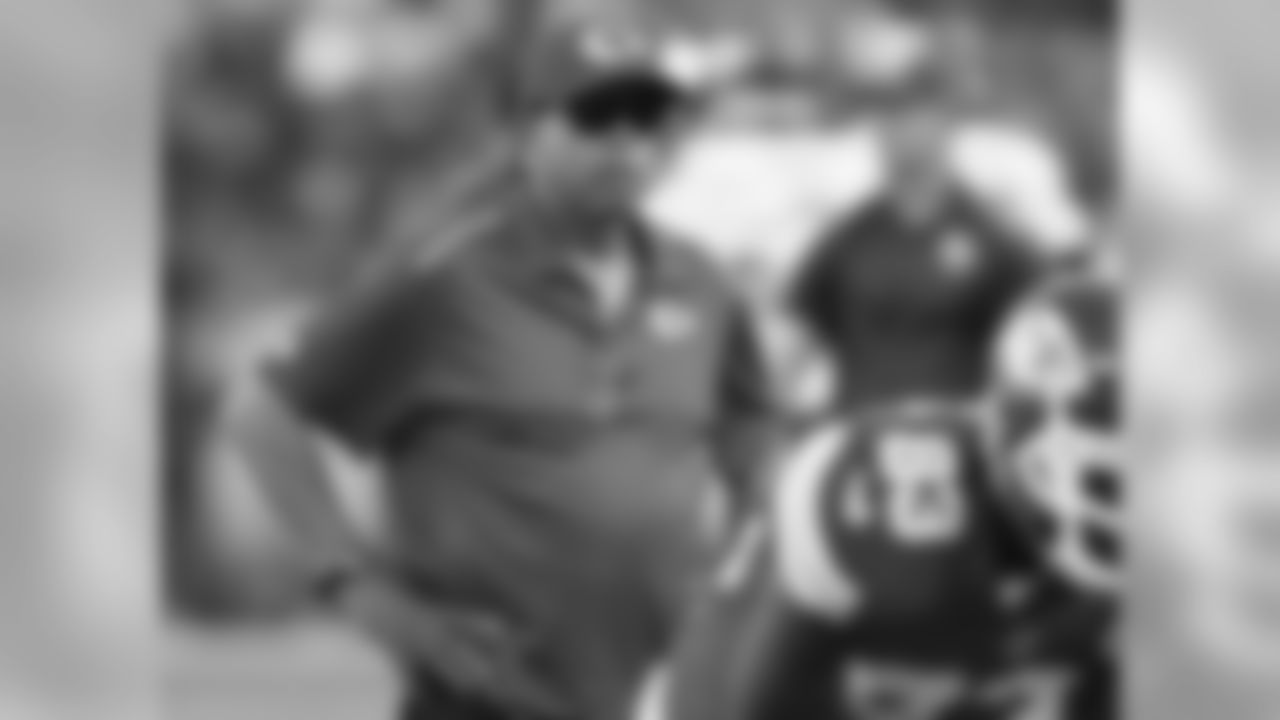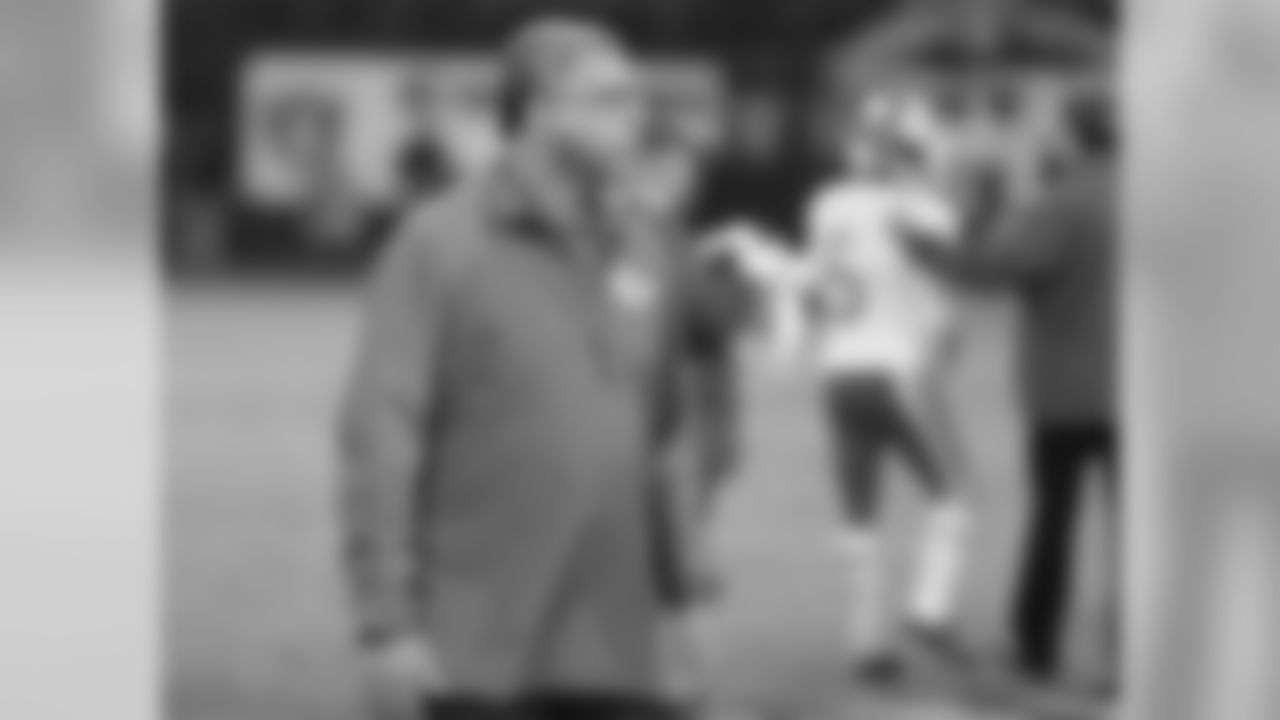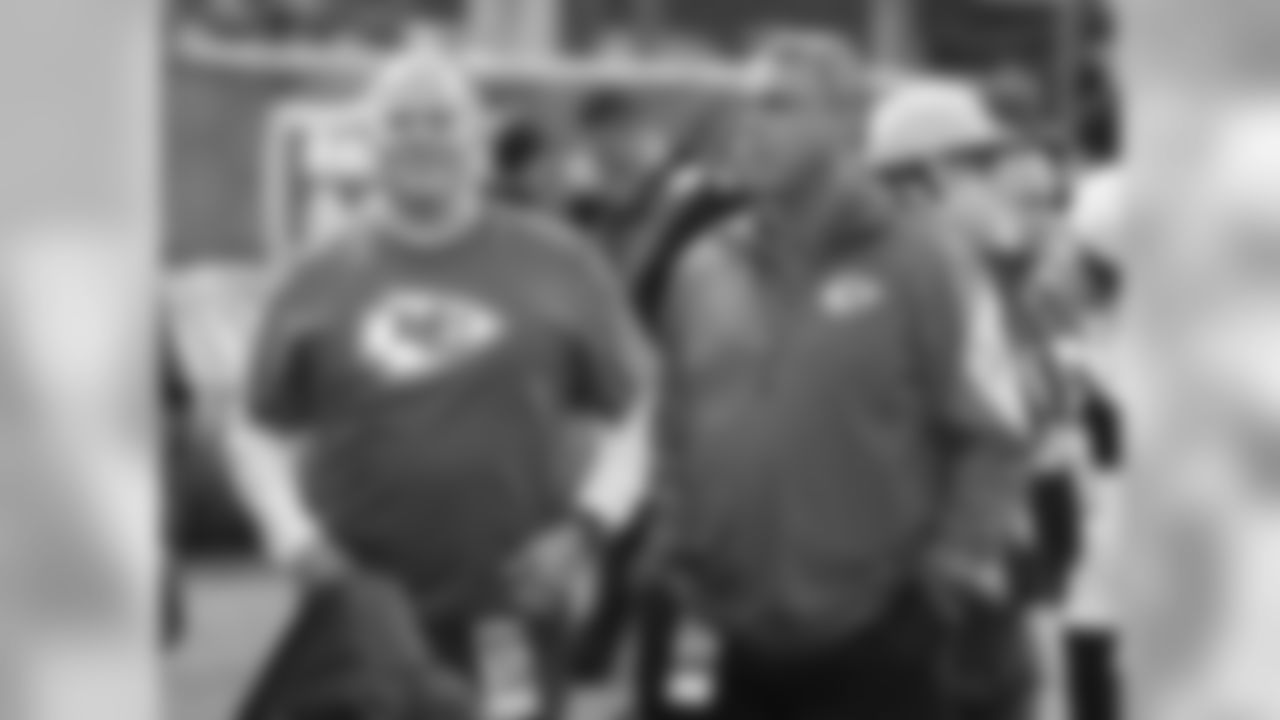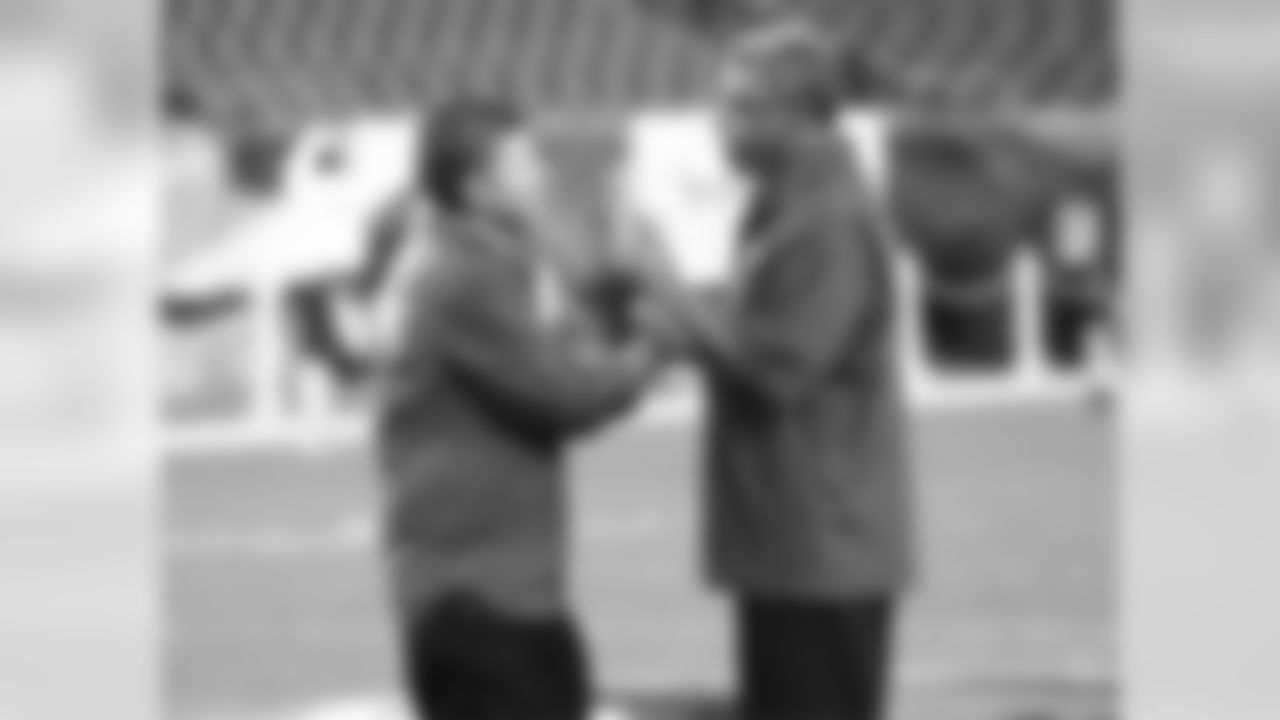As he sits back in his office chair with the usual smile those who have spent any time around him have become accustomed to, Kansas City Chiefs assistant head coach David Culley opens up about a coaching career that has been anything but a straight path.
Culley has spent 22 years in the NFL and currently coaches the receivers in Kansas City. Before joining the NFL ranks, Culley spent 16 years at the collegiate level.
Altogether, Culley has made 12 different stops in his 38-year coaching career.
Despite the longevity, success and knowing he wanted to be a coach at some level when he finished up his playing career at Vanderbilt back in 1977, the NFL was never the goal for Culley.
"I never had any ambition to coach in the NFL," Culley said. "Never. Not once. I'm telling you—my ambition was to go back to White County High School in Sparta, Tennessee, and be an assistant coach and teach at my high school.
"I actually got into this league because my wife said, 'Just try it.'"
It's been a long journey for Culley, his wife and their two kids to get to where they are today. But he'll be the first to tell you that despite not having that initial ambition, football has meant a lot to his family as he sits here today.
"There are places we've visited and things we've done that never would have been possible without this profession," he said. "My wife Carolyn and I have put both of our kids through college at the University of Pennsylvania and University of Pittsburgh on a 'Culley scholarship.'
"Football has allowed me to take care of my family."
Culley's Path: From Pittsburgh to Philadelphia to Kansas City

They hadn't ever actually coached together prior to Philadelphia, but Culley and Chiefs head coach Andy Reid's paths brushed up against one another a couple of times.
Culley was part of the coaching staff that came to the University of Texas at El Paso right after Reid and company departed for the University of Missouri back in 1989.
While Reid was working with the tight ends and offensive line for the Green Bay Packers (1992-98), Culley spent the '94 and '95 seasons competing against them as the receivers coach for the Tampa Bay Buccaneers back when they were in the NFC North together.
Once Reid took the head coaching position with the Philadelphia Eagles in 1999, he needed a receivers coach.
At the same time, Culley was looking for a new spot to land after working the previous three seasons as the receivers coach with the Pittsburgh Steelers.
Always a man with options, Culley had three interviews lined up that offseason—the Green Bay Packers, Seattle Seahawks and then the Philadelphia Eagles.
"He figured out the order in which I was taking the visits," Culley said of Reid with a smile. "I find out later that he's pretty smart."
At the time he was setting up these visits, Culley was still in Pittsburgh.
"He said, 'Look, I know you're going to Green Bay, I know you're going to Seattle and then coming here, but I also know you're not leaving for a day to go there."

Since Philadelphia wasn't that far away and Reid knew it was important to get to him first, Culley said Reid pulled out all the stops to not only get him to Philly, but also keep him there.
"He said 'Just get on a plane right now or drive, whatever you think you can do,'" Culley recalled of Reid. "'We can get you on a plane right now and just come down and let's talk before you go.'"
It worked. Culley changed his plans and visited Philly first.
"We didn't even talk about football," Culley laughed. "Reid just offered me the job and then he started recruiting me.
"He said 'I know you're going to Green Bay. I've coached in Green Bay. I know about Green Bay.' He said 'It's very cold in Green Bay.'
"I said 'Coach, I know. I got no problem with cold, because if I did, I wouldn't be going.'
At this point, Culley is laughing while telling the story.
"I knew what he was doing."
Culley continued.
"And then Reid says 'You know Seattle is at the very end. You're almost in Canada or whatever in Seattle.'
"I said 'I'm also close to Hawaii too, coach.'
"Then he says 'Listen, I know your family and I know how it is. Your son is going to the University of Pittsburgh. You're only five hours away, which isn't the case in Green Bay.
"I want to offer you this job. I'm going offer you this job, but I don't want you going to Green Bay and I don't want you going to Seattle.'"
Culley took those words back to his wife and also his mentor, James "Boots" Donnelly, who had given Culley his first coaching job at Austin Peay State University back in 1978 as the running backs coach.
"I've never taken a job without talking to either of them first," he said.
As soon as Culley began talking to his wife and mentioned what Reid had said, she repeated those same words back to him about being close to family by staying in Pennsylvania.
"He's smart," Culley said. "He knew what he was doing."

After 14 years in Philly and now heading into their third year together in Kansas City, they both seemed to have known what they were doing.
"I love the fact that of all the coaching jobs that I ever had, I'm talking from college to the NFL, I've been able to spend more time with my family coaching for him than anyone I've ever worked for," Culley said. "It's important to him and he knew that it's important to me.
"I love my job, but I don't love my job more than my family."
Reid explained that his mutual respect for Culley is what has made him such a valuable piece of his coaching staff over all these years.
"I think he's honest," Reid said. "I think he gives you the same picture every day. He's upbeat and he loves life. He's an energy giver and he's optimistic.
"If things aren't going well, he's going to find out the problem and he's going to fix it. He's not going to hang his head about it. He's brutally honest with the players saying, 'Hey you're doing a great job' or 'You're screwing up. Here's what you have to do.'
"He really teaches them."
One of the Chiefs' newest receivers, veteran Jeremy Maclin, spent four years with Culley in Philadelphia after Reid and company selected him in the first round of the 2009 NFL Draft.
"I respect him," Maclin said of Culley. "He has a lot of knowledge and he's coached a lot of great guys too. When you have a guy that you can learn from who has had TO (Terrell Owens), who's had some of the guys he's had in Pittsburgh. You respect that because they've seen it and they've seen it done at a high level.
"It makes you eager to learn. It makes you want to learn."
After 16 years together, which includes just three losing seasons and a winning percentage in the regular season of .612, Culley says the success with coach Reid is all about consistency.
"I know what he (Andy Reid) wants," he explained. "I could tell you right now, a year from now on this day, what he will be doing because of the consistency he has and what he wants because he has a plan and we know what that plan is.
"What I found out in coaching is the successful people—the head coaches, the coordinators, are successful because they know what they want to do and everybody working for them understands what they want to do."
Culley's Path: The White County High School Warriors (Sparta, Tennessee)

Culley grew up in the small Tennessee town of Sparta, which sits about 100 miles east of Nashville with a population of around 5,000.
As a kid, it wasn't just about football for Culley.
"Just give me a ball—it can be a ping pong ball, volleyball, baseball, whatever, I'm comfortable," he said. "Just give me the rules and regulations and I'm good with that.'"
In basketball, Culley played point guard. In baseball, he was a pitcher and in football, he played quarterback.
He always wanted the ball in his hands and football is where he excelled.
"My best memory would be starting as a sophomore," Culley shared of his high school career for the [White County High School] Warriors. "When I was in school, the freshmen were in junior high. I came from a freshman team that was undefeated, played with some really good players.
"After about a week, I was starting at quarterback and playing with a lot of older guys. I was the only sophomore that was starting on the varsity team."
The family tradition of Warriors football is well documented in Sparta, and for Culley, that sophomore season of playing varsity is where he believes his love and passion for the game really began.
"I knew it was something special and I didn't know it then, but when I think back on it—that was the moment."
Culley's Path: The Vanderbilt Commodores

As a standout quarterback for the Warriors, Culley had options when deciding where he wanted to play college football.
One of his good friends, Watson Brown, the older brother of former University of Texas coach Mack Brown and a distinguished coach himself, played quarterback at Vanderbilt from 1969 to 1972.
Brown, who now has 42 years of experience and is currently at Tennessee Tech, attended Culley's rival, Cookeville High School, and was a few years ahead of Culley, but the two were good friends.
One particular moment of Brown's career with the Commodores stood out to Culley.
"They had upset Alabama and (Brown) was on the cover of Sports Illustrated," Culley recalled. "When it came time to get recruited, and I was recruited by a lot of people, I always wanted to follow him.
"He was going to be going out and I was going to be coming in."
There was a coaching change at Vanderbilt the year before Culley arrived.
"The new coach was a guy named Steve Sloan," he said. "The defensive coordinator, and the guy that was recruiting me, was named Bill Parcells."
Culley recalled his first impression of Parcells.

"He was an imposing guy. Very tall, very confident, just like he is when you see him on television. He told me, 'If you aren't any good on offense, I'm going to bring you over on defense.'
"He was intimidating in a way, but he was a great recruiter and he convinced me to come there."
Before Culley, every other black quarterback that signed at Vanderbilt had been asked to change positions.
Walter Overton, a standout high school player in Nashville who had been recruited to Vanderbilt two few years prior to Culley, was moved to receiver right away.
"They assured me I was going to be a quarterback and I wasn't going to be moved," Culley recalled of his recruitment.
A few years prior to Culley signing with Vanderbilt, the basketball team at Vandy had made news when they made Perry Wallace the first black basketball player to play under scholarship in the Southeastern Conference.
Soon after, Culley became the first black quarterback in Vanderbilt history.
But it was the education side of Vanderbilt that most surprised Culley when he arrived.
"I didn't go to school to get an education," he stated. "I went to school to play football."
But things quickly changed for Culley.
"I remember a professor used to tell me, he said 'Listen, I know what you're here for, but you're never going to play football if you don't go to school here and if you don't go to school here, they will throw you out because they have a waiting list to replace you.
"That stuck with me."
Culley continued.
"I remember as a freshman being around kids that felt like in four years or five years, they were going to be successful in whatever it is that they were going to do. That just resonated with me."
Photos of Assistant Head Coach and Wide Receivers Coach David Culley.










Culley's Path: The Coaching Journey
After finishing up his playing career at Vanderbilt, James "Boots" Donnelly gave Culley his first coaching opportunity at Austin Peay State University. They had been together at Vanderbilt when Donnelly worked as an assistant coach.
At the time, Culley still wanted to be a high school coach and Donnelly convinced him that if he had his master's degree, he'd be paid more as a high school teacher. They would be willing to pay for his grad school while he coached.
Culley agreed and took the job as the running backs coach. In addition to coaching, he was taking 12 hours per semester as a full-time grad student.
It was a lot to handle.
One of his former assistant coaches at Vanderbilt, George MacIntyre, whose son is now the head coach at Colorado and someone Culley said he used to babysit, got the head-coaching job at Vanderbilt and recruited Culley back there for his first full-time coaching position.
Culley said once he went back to Vanderbilt under coach MacIntyre, that's when he really developed his love for coaching.

It doesn't take long when talking with Culley to find out the aspect of coaching at the collegiate level that he enjoyed.
"Recruiting was easy for me because recruiting is talking and relationships," he said. "I can talk, so that wasn't an issue, but the point was getting guys to do what you want them to do was different.
"I was very fortunate that I was with a bunch of coaches that were veterans who showed me the ropes and were great teachers. All I wanted to do was teach."
Culley spent the 1979-81 seasons at Vanderbilt, followed by stops at Middle Tennessee State (1982-RBs, QBs), Tennessee-Chattanooga (1983-WRs), Western Kentucky (1984-QBs, WRs), Southwestern Louisiana (1985-88 QBs), Texas El Paso (1989-90 OC, RBs, QBs) and Texas A&M (1991-93 WRs).
All of that experience and traveling gave Culley a unique perspective on coaching football.
"It helped me in seeing there's more than one way to do things," he said of all of those stops. "I was around different coaches that did things different and had different philosophies, but the one thing was still teaching fundamentals.
"Regardless of the offense or defense you're running, regardless of the scheme you're running, blocking and tackling, throwing and catching, is the same everywhere."
Before he made the jump to the NFL, Culley said he was in the best place possible to be a college football coach.
"When I was at Texas A&M, I felt like I had died and gone to heaven as a college coach," Culley said. "I was there with the wrecking crew. R.C. Slocum, great football teams. Lost five games in three years total. To me, it was the best."
After three years at Texas A&M (1991-93), Culley received a call from Sam Wyche, who was then the head coach of the Tampa Bay Buccaneers.
Their paths had crossed before and Wyche was looking for a receivers coach.
Culley, who never had the ambition of coaching in the NFL, finally had his opportunity.
But the decision to leave Texas A&M wasn't going to be an easy one, and it was Slocum who actually helped convince him to make the jump.
"It's the best of the best," Culley recalled of Slocum's message to him. "Go do it and if it doesn't work out, you can always come back.'
"Now, 22 years later and never having had any ambition to do this—I've loved every minute of it, I mean every minute of it."
Culley's Path: His addictive hobby
It all started at Southwestern Louisiana University, which is now known as Louisiana-Lafayette.
That's where Culley, the quarterbacks coach at the time who led Brian Mitchell in becoming the first player in NCAA history to pass for more than 5,000 yards and rush for more than 3,000 yards in a career, developed a habit that consumes him to this day.
Part of a coach's responsibility is sometimes going out to the golf course for a tournament with some of the program's boosters.
It's a nice way to relax and glad-hand some of the key financial contributors to a football program or school.
But for Culley, the nice relaxing day at the course wasn't anything but—considering he was awful, as he describes.
"I didn't even have my own clubs," he said. "So I started playing and I was hitting it everywhere—never hit the ball down the fairway.
"I'd hit the ball by a tree. I'd go over and I'd get the ball and I'd place it down and hit it.

"They said 'You can't do that.' I said 'Why can't I do that?' I said 'I can't hit it off that tree, so I'm going to take it and put it over here where I can hit it.'
"And the guy said 'Well, that's going to cost you a stroke.'
"I said 'I have no problem with that because I can't hit it off that tree, I can hit it over here.'
The frustration of not being very good combined with the challenge of not being very good consumed Culley. He worked on it and worked on it and now looking back, he wishes he had started earlier.
"After playing for about three or four years, I said 'Man, I was stupid,'" Culley said. "I used to make fun of people for playing golf. It's stupid hitting that little golf ball in that little hole.' Stupid? I was stupid. Not them.
"I was stupid for never even attempting to do it because right now, I got it bad. I'm like addicted."
Culley's favorite course is Pine Valley Golf Club in New Jersey.
"It took me nine years to get on it, but I finally got on it and when I got on it, I felt like I had died and gone to heaven."
In Kansas City, his favorite course is any that he can get on in any given day.
While he says he's much improved over his days in Louisiana, Culley said his score doesn't really matter.
"I love it so much my score doesn't really matter. I've adopted this philosophy—I've had bad scores but never bad rounds."
Culley's Path: Validation and what really matters
After more than two decades of coaching at the collegiate and professional levels, there's one moment that stands out to Culley that he'll never forget.
Former Eagles receiver Terrell Owens, who had already put together five 1,000-yard seasons and four 13-plus touchdown seasons in San Francisco before joining the Eagles in 2004, came up to Culley after practice one day in 2005.
"He came up to me and said 'Culley, don't ever quit coaching me.'
"He validated me that day."

Culley said Owens is the best practice player he's ever coached, that nobody ever worked harder and that he didn't necessarily need the coaching.
But Owens wanted the coaching—from Culley, whom he respected.
"All they want is to be the best at what they do," Culley explained. "They're going to ask you 'What can I do to get better?' And you better have an answer.
"If you have an answer and you can make them better, they'll run through a wall for you. Even at this level, it's no different than in high school."
Culley has always had answers for players who come to him with questions.
His outgoing personality, demeanor and belief in himself allows him to work with the confident players that may not always like what they're about to hear.
"He's as honest as they come," Maclin said. "He's going to tell you how it is and you may not like it, but he's going to tell you how it is and he's going to do it in a respectful way.
"The most important thing I want my coach to do is be honest with me. The second is teaching me what I need to know—Culley does both of those."
Maclin shared more about his relationship off the field with Culley and how that played a part in him making the decision to sign with Kansas City.
"We've remained close over the years," Maclin said. "I may have a bad day—I'll text him and he'll let me know 'Hey man, just keep your head up and understand how good you are, understand why you're in the position that you're in.'
"It was a big factor why I came (to Kansas City) and I have nothing but love for him and Big Red and all those guys. It's not just a coach-player relationship. We're actually friends and it's deeper than that, so I couldn't ask to be in a better position."
While the success Culley has had developing players throughout his 38 years of coaching the college and professional ranks has given him a long, distinguished career, the NFL, as ruthless as it is at times and for everything it's given to he and his family, still doesn't define him as a person.
"We're judged on how many wins we get," Culley explained. "But as a dad, husband and human being, I'm more than just this job.
"Balance is the best thing you could ever have in your life. It doesn't matter what you're doing."
Culley has found that balance and anyone who spends any time around him can see the love he has for what he's doing.
He's always smiling, always upbeat and always looking for time to get in that next 18.













